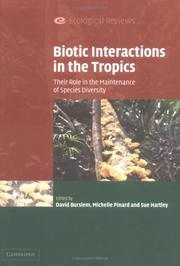| Listing 1 - 3 of 3 |
Sort by
|
Article
Abstract | Keywords | Export | Availability | Bookmark
 Loading...
Loading...Choose an application
- Reference Manager
- EndNote
- RefWorks (Direct export to RefWorks)
Book
ISBN: 9780521157124 9780521193269 0521157129 0521193265 9781139379199 1139379194 9780511675751 1107223245 1139365290 1139376330 1280647191 9786613633248 1139377760 1139374907 0511675755 113937091X Year: 2012 Publisher: Cambridge Cambridge University Press
Abstract | Keywords | Export | Availability | Bookmark
 Loading...
Loading...Choose an application
- Reference Manager
- EndNote
- RefWorks (Direct export to RefWorks)
Plant secondary metabolites (PSMs) such as terpenes and phenolic compounds are known to have numerous ecological roles, notably in defence against herbivores, pathogens and abiotic stresses and in interactions with competitors and mutualists. This book reviews recent developments in the field to provide a synthesis of the function, ecology and evolution of PSMs, revealing our increased awareness of their integrative role in connecting natural systems. It emphasises the multiple roles of secondary metabolites in mediating the interactions between organisms and their environment at a range of scales of ecological organisation, demonstrating how genes encoding for PSM biosynthetic enzymes can have effects from the cellular scale within individual plants all the way to global environmental processes. A range of recent methodological advances, including molecular, transgenic and metabolomic techniques, are illustrated and promising directions for future studies are identified, making this a valuable reference for researchers and graduate students in the field.
Plant metabolites --- Plantes --- Métabolites --- Plant metabolites. --- Metabolism, Secondary. --- Plant ecology. --- Botany --- Phytoecology --- Plants --- Vegetation ecology --- Ecology --- Secondary metabolism --- Metabolism --- Metabolites --- Plant products --- Floristic ecology

ISBN: 0521847079 0521609852 9780521609852 9780521847070 9780511541971 051154197X 9780511128011 0511128010 0511127480 9780511127489 1107152607 1280434902 9786610434909 051120017X 0511182538 0511300603 Year: 2005 Publisher: Cambridge Cambridge University Press
Abstract | Keywords | Export | Availability | Bookmark
 Loading...
Loading...Choose an application
- Reference Manager
- EndNote
- RefWorks (Direct export to RefWorks)
Tropical ecosystems house a significant proportion of global biodiversity. To understand how these ecosystems function we need to appreciate not only what plants, animals and microbes they contain, but also how they interact with each other. This volume, first published in 2005, synthesises the state of knowledge in this area, with chapters providing reviews or case studies drawn from research conducted in both Old and New World tropics and including biotic interactions among taxa at all trophic levels. In most chapters plants (typically trees) are the starting point, but, taken together, the chapters consider interactions of plants with other plants, with micro-organisms and with animals, and the inter-relationships of human-induced disturbance with interactions among species. An underlying theme of the volume is the attempt to understand the maintenance of high diversity in tropical regions, which remains one of the most significant unexplained observations in ecological studies.
Ecology --- Biotic communities --- Species diversity --- Ecologie --- Ecosystèmes --- Diversité des espèces --- ECO Ecology --- biodiversity --- ecology --- plant-animal relationships --- tropical forests --- tropical regions --- 574.4 --- Terrestrial biocoenoses and ecosystems. Biogeocoenoses. Biogeochemical cycles. Food chains --- 574.4 Terrestrial biocoenoses and ecosystems. Biogeocoenoses. Biogeochemical cycles. Food chains --- Ecosystèmes --- Diversité des espèces --- Diversity, Species --- Richness, Species --- Species richness --- Biodiversity --- Biocenoses --- Biocoenoses --- Biogeoecology --- Biological communities --- Biomes --- Biotic community ecology --- Communities, Biotic --- Community ecology, Biotic --- Ecological communities --- Ecosystems --- Natural communities --- Population biology
| Listing 1 - 3 of 3 |
Sort by
|

 Search
Search Feedback
Feedback About UniCat
About UniCat  Help
Help News
News